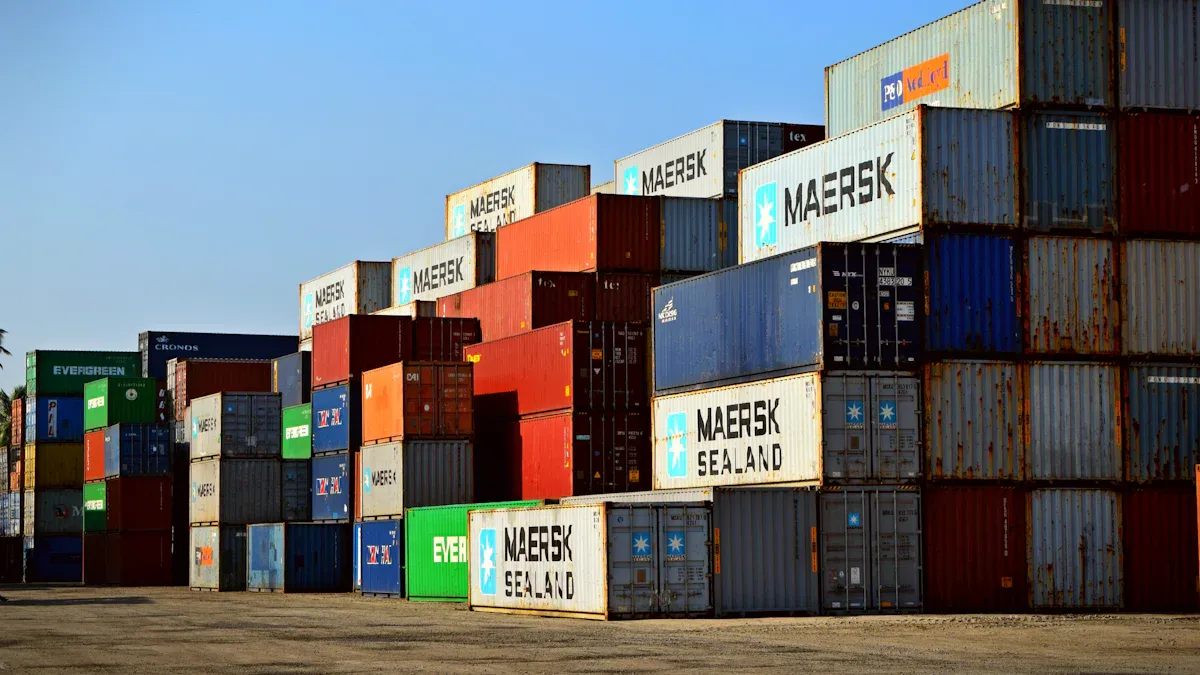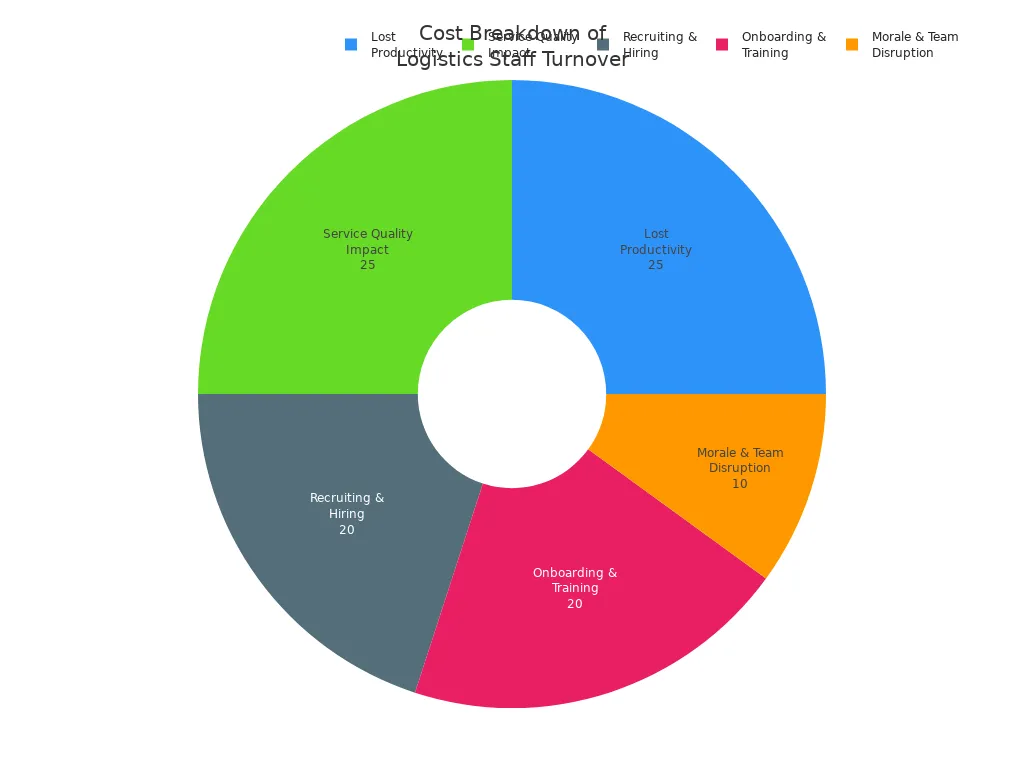Hiring the Wrong Salespeople and Its Costly Impact on Logistics Firms

High turnover in logistics sales creates a costly disaster zone for many firms. The challenge grows when companies face retention difficulties that exceed the national average for sales professionals, which stands at 8.3%.
Hiring the Wrong Salespeople can destabilize teams, erode client trust, and drain company resources. Leaders must examine current hiring practices to uncover hidden risks that threaten business growth.
Key Takeaways
Hiring the wrong salespeople leads to high costs from recruiting, lost productivity, and team disruption that hurt logistics firms financially.
High turnover lowers team morale, slows workflow, and damages customer trust, which can cause clients to leave and harm the company’s reputation.
Common hiring mistakes include misaligned recruitment, lack of continuous hiring, and relying too much on HR without sales leader involvement.
Logistics firms should define clear success traits, use strong evaluation methods, and invest in structured onboarding to keep sales teams stable and productive.
Partnering with recruitment experts and building diverse teams helps attract the right talent and supports long-term business growth.
Financial Costs

Recruitment Expenses
Recruiting new salespeople in logistics firms creates a significant financial burden. Companies must cover a range of administrative expenses when hiring, including:
Safety wages and benefits
Facility costs
Office supplies
Dues and subscriptions
Meals and entertainment
These expenses add up quickly, especially when turnover rates remain high. Recruiting is not just a one-time cost. Each new hire requires investment in advertising, screening, and interviewing. These activities take time and resources away from other business priorities.
Lost Productivity
New salespeople in logistics rarely reach full productivity right away. Most need two to three years to become fully effective in their roles. The first year often serves as a survival period. During this time, new hires adjust to the company, learn procedures, and build their client base. Productivity remains low, and experienced team members must spend extra time training and supporting newcomers. This slows down the entire team and reduces overall output.
Turnover Costs
High turnover in logistics sales teams leads to both direct and indirect costs. Direct costs include recruiting, hiring, onboarding, and training. These can range from $3,000 to $6,000 per replacement. Indirect costs often have a greater impact. Lost productivity, service quality issues, and morale problems can disrupt operations and damage customer relationships.
Cost Component | Approximate Percent of Total Cost |
|---|---|
Recruiting & Hiring | 20% |
Onboarding & Training | 20% |
Lost Productivity | 25% |
Service Quality Impact | 25% |
Morale & Team Disruption | 10% |
Total | 100% |

Turnover also causes hidden losses. When experienced employees leave, they take valuable knowledge and client relationships with them. Remaining staff may feel discouraged or overworked, which can lead to even more resignations. Over time, these financial costs can erode profit margins and threaten the stability of the entire firm.
Operational Impact

Team Morale
High turnover in logistics sales teams creates a ripple effect that damages morale. Employees often feel uncertain when leadership and processes change frequently. This instability leads to stress and confusion. Team members must train new hires and cover extra work, which distracts them from their main responsibilities. Over time, these pressures delay company goals and reduce motivation.
Common signs of low morale include:
Increased absenteeism and frequent sick days
Negative attitudes and complaints about work
Declining performance and missed deadlines
Lack of enthusiasm or energy during meetings
Resistance to feedback and reluctance to collaborate
Higher rates of burnout and turnover among top performers
A single hiring mistake can lower productivity by up to 36%. Team morale may drop by nearly 40%. As good employees leave, those who remain may feel undervalued and uncertain about their future. This cycle can create a toxic work environment and make it even harder to retain talent.
Note: Poor management styles and lack of career advancement also contribute to low morale. When employees do not see a path forward, they lose their sense of connection and advocacy within the company.
Disruption to Workflow
Hiring the wrong salesperson disrupts daily operations in logistics firms. Mistakes such as entering incorrect product SKUs can cause the wrong items to ship. This error sets off a chain reaction:
Customer service receives complaints and must resolve issues.
The warehouse processes returns and prepares the correct shipment.
Logistics teams handle additional shipping tasks.
Sales staff manage customer relations and try to rebuild trust.
Inventory data becomes inaccurate, leading to stockouts or over-ordering.
These disruptions force teams to shift focus from their core tasks. Productivity drops as employees spend time fixing errors. Financial losses can occur from double shipping costs, discounts, or credits to customers. The order-to-cash cycle extends, which impacts cash flow.
Strategic damage also follows. Customers may lose trust in the company’s ability to deliver reliably. Internally, teams may begin to doubt the accuracy of operational data. This slows decision-making and increases uncertainty across the business. Over time, workflow disruptions can erode both team spirit and the company’s reputation.
Client Risks
Lost Accounts
Losing the right salespeople puts client relationships at risk. Logistics firms depend on strong account management to keep customers satisfied. When turnover rises, account managers change often. This disrupts the flow of information and weakens trust between the company and its clients.
High turnover breaks the continuity of account management. Clients may need to repeat their needs to new representatives.
New sales staff often lack knowledge about client-specific requirements. This leads to missed shipments, service errors, and lost opportunities for cost savings.
Delays or mistakes in shipments cause customer frustration. Some clients may switch to competitors who offer more reliable service.
Long-term clients may leave if they feel the company cannot deliver on time or in full. This loss damages brand loyalty and reduces future revenue.
Logistics firms can reduce these risks by keeping communication open, involving senior leaders in key accounts, and training new hires quickly. Codified processes help maintain service quality even when staff changes occur. However, frequent turnover still increases the chance of losing valuable clients.
Damaged Reputation
A damaged reputation can hurt a logistics firm for years. Poor sales hires often create problems that go beyond lost deals. They may mishandle client interactions, miss deadlines, or fail to follow through on promises. These mistakes become public knowledge and affect how others view the company.
Missed opportunities and unconverted leads lower revenue and waste resources.
Inconsistent sales performance makes forecasting difficult and disrupts strategic planning.
Ineffective hires require extra oversight, pulling managers away from core business tasks.
Negative experiences, such as poor communication or lack of follow-up, harm the company’s brand. This makes it harder to attract both new clients and top talent.
A damaged reputation erodes customer trust and loyalty, reducing future business opportunities.
Logistics firms must protect their reputation by hiring carefully and supporting their sales teams. A strong reputation builds trust, attracts new business, and keeps existing clients loyal.
Hiring the Wrong Salespeople: Pitfalls
Misaligned Recruitment
Many logistics firms struggle with misaligned recruitment. This happens when hiring managers do not match sales talent to the company’s business strategy. For example, a company focused on cross-border logistics may hire salespeople with only domestic experience. This mismatch leads to poor results and high turnover.
Common misalignments include:
Increased competition for sales talent as logistics demand grows
Higher standards for sales roles, requiring up-to-date knowledge of regulations
Talent shortages due to retiring professionals and few new entrants
Candidates seeking work-life balance and career growth, which some firms cannot offer
Location-specific challenges in finding candidates with local market knowledge
Logistics companies often face a choice between experienced salespeople with existing client lists and passionate newcomers. Experienced hires may bring quick results but often focus on current clients instead of finding new business. Newcomers, if trained well, can drive growth and adapt to new strategies. When recruitment does not align with business goals, new hires leave quickly, and the company wastes time and money.
When companies rush to fill roles, they may ignore the need for skills-based hiring. This leads to new hires who do not understand the job or the company’s expectations. As a result, turnover increases, and teams lose stability.
Lack of Continuous Hiring
Some logistics firms treat hiring as a one-time event. They only recruit when someone leaves. This approach creates gaps in the sales team and puts pressure on existing staff. Critical roles stay empty, and teams become overstretched. Sales leaders must spend time recruiting and onboarding, which takes them away from important tasks like closing deals.
Continuous hiring gaps cause missed sales targets and lower morale.
Over one-third of logistics leaders report a severe shortage of experienced sales talent.
Talent shortages create delays, missed opportunities, and unhappy customers.
Traditional hiring methods move too slowly, forcing companies to settle for less qualified candidates.
A lack of continuous hiring weakens the team and makes it harder to reach business goals. Interim or temporary hires can help fill gaps and keep service levels high while searching for permanent staff.
Homogenized Teams
Homogenized teams form when managers hire people who look, think, or act like themselves. This often happens unconsciously. For example, a manager who values aggressive sales tactics may only hire similar personalities. Over time, the team loses diversity and struggles to meet the needs of different customers.
Diverse sales teams bring many benefits:
They offer new ideas and creative solutions.
Cultural competence and language skills help connect with clients from different regions.
Diversity expands market reach and builds stronger customer relationships.
Inclusive teams show higher engagement, retention, and productivity.
When teams lack diversity, they miss out on these advantages. The company may struggle to innovate or adapt to changing customer needs. Homogenized teams often fail to grow the business and may even drive away top talent.
Over-Reliance on HR
Some logistics firms rely too much on the HR department to handle sales recruitment. HR teams may not fully understand the unique skills needed for logistics sales. As a result, they may screen out strong candidates or pass along resumes that do not fit the role.
Sales leaders must take an active role in hiring. They know what the team needs and can spot the right qualities in candidates. When HR works alone, the process becomes slow and less effective. The company risks hiring the wrong people, which leads to more turnover and wasted resources.
Sales recruitment is not a task to delegate completely. Direct involvement from sales leaders ensures better alignment with business needs and improves hiring outcomes.
Hire-Then-Decide Approach
The hire-then-decide approach means bringing in many new salespeople and letting performance sort them out later. Some managers believe this saves time, but it often creates bigger problems. Salespeople are not easy to replace. They interact with clients, team members, and other departments every day. If a new hire does not fit, the damage can spread quickly.
Poor hires can take valuable clients and even other employees with them when they leave.
Negative experiences with former staff can harm the company’s reputation.
High turnover disrupts the team and makes it harder to build trust with clients.
Hiring the Wrong Salespeople through this approach leads to instability and higher costs. It is better to invest time in careful selection and onboarding than to fix problems after the fact.
In logistics sales, every hiring decision shapes the team’s future. Avoiding these pitfalls helps companies build strong, stable sales teams that drive growth and protect client relationships.
Prevention Strategies
Define Success Traits
Logistics firms should start by identifying the traits that predict sales success. Top performers in this field act as informed, likable, and trustworthy partners. They build strong relationships and match solutions to customer needs.
Key traits include:
Deep product and market knowledge
Strong communication and negotiation skills
Ability to understand and solve client problems
Trustworthiness and reliability
A formal sales process also supports success. Teams that specialize in niche markets, qualify leads carefully, and stay current with trends often outperform others. By defining these traits, companies can avoid Hiring the Wrong Salespeople and build a team that drives growth.
Improve Evaluation
Effective evaluation methods help firms spot top talent.
Recommended steps:
Identify different sales styles needed for the team, such as technical experts or relationship builders.
Assess strengths and weaknesses of current staff to find gaps.
Use skills tests, situational judgment tests, and behavioral interviews to measure real abilities.
Include job simulations and work sample tests for practical insight.
Check cultural fit to ensure long-term success.
Ongoing evaluation keeps the team aligned with business goals. Tools like hiring assessments and cost-of-failure calculators can help measure the impact of each hire.
Invest in Onboarding
Structured onboarding programs boost retention and productivity.
Good onboarding helps new hires feel welcome and prepared. It can increase retention by up to 82% and improve productivity by over 70%.
Effective onboarding includes clear goals, mentorship, and social integration. Companies that invest in onboarding see higher job satisfaction and lower turnover. Addressing career development early also increases commitment and engagement.
Use Recruitment Experts
Specialized recruitment experts bring deep industry knowledge. They understand logistics sales roles, market trends, and the skills needed for success. These experts use targeted strategies, such as networking and social media, to attract top talent.
They focus on proven sales performance and cultural fit, helping firms avoid common hiring mistakes. Partnering with recruitment experts leads to a more effective and results-driven hiring process.
Hiring the Wrong Salespeople creates high costs for logistics firms. Teams lose money, face workflow problems, and risk losing clients. Smart companies use ongoing recruitment and avoid common mistakes. Leaders should review their hiring process and make changes for better results. Taking charge of recruitment helps build strong teams and protects the business.
FAQ
What are the main risks of hiring the wrong salespeople in logistics?
Hiring the wrong salespeople can cause lost revenue, lower team morale, and damaged client relationships. Companies may also face higher turnover and increased training costs.
How can logistics firms reduce sales team turnover?
Firms can define clear success traits, use structured onboarding, and involve sales leaders in hiring. Continuous recruitment and regular team evaluations also help keep turnover low.
Why is diversity important in logistics sales teams?
Diverse teams bring new ideas and connect with more clients. They help companies adapt to different customer needs and expand into new markets.
Should HR handle all sales recruitment?
Sales leaders should lead the hiring process. HR can support with screening and logistics, but only sales managers know the skills needed for success.
What tools help improve sales hiring decisions?
Companies use skills assessments, behavioral interviews, and cost-of-failure calculators. These tools help identify top talent and reduce hiring mistakes.
See Also
Understanding Emerging Trends In Logistics Risk Management
Unlocking Supply Chain Efficiency Through Logistics Cost Savings
How To Cut Costs And Save On Supply Chain Spending
Boosting Warehouse Output With Advanced Logistics Robotics Technology
Transforming Logistics Through Cutting-Edge Supply Chain Innovations
